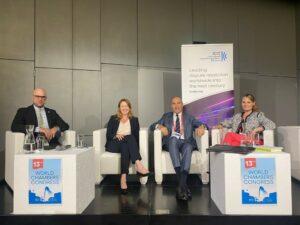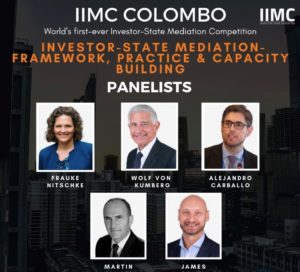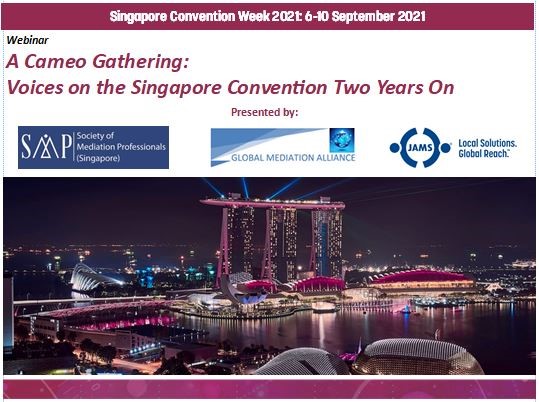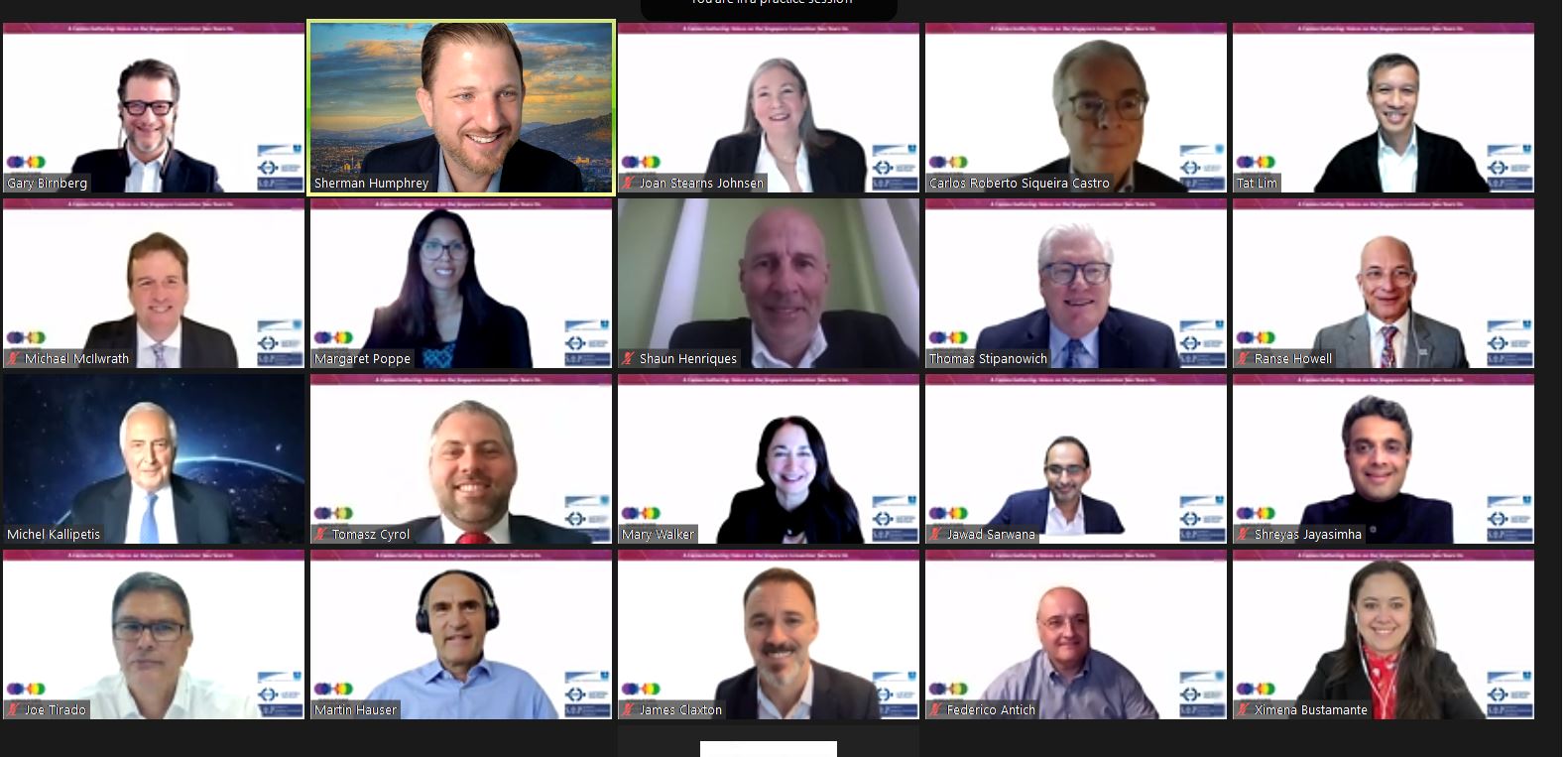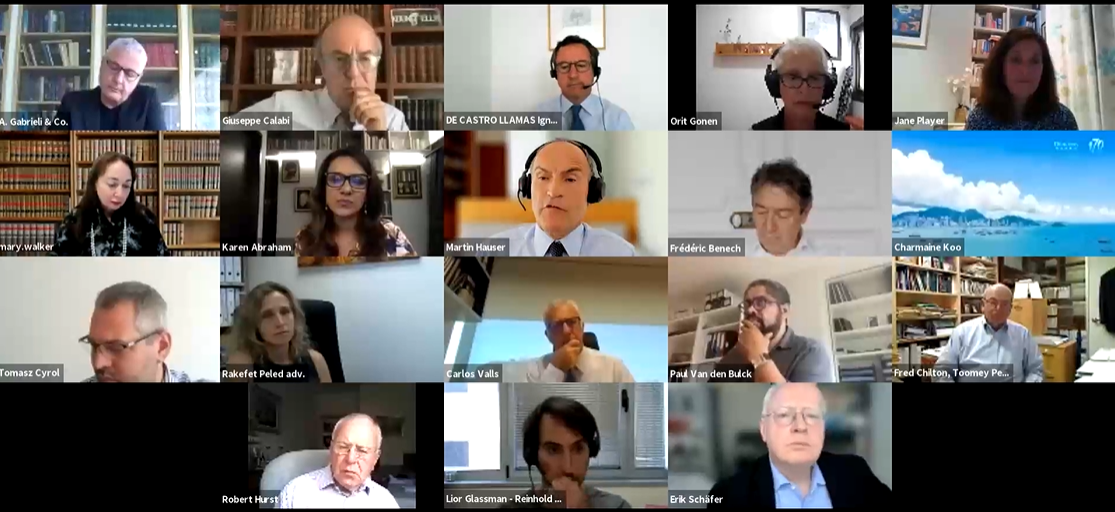2024
[MEDIATION & NEGOTIATION] Mediator at the 19th ICC International Commercial Mediation Competition, February 5 to 10, 2024, Paris, France
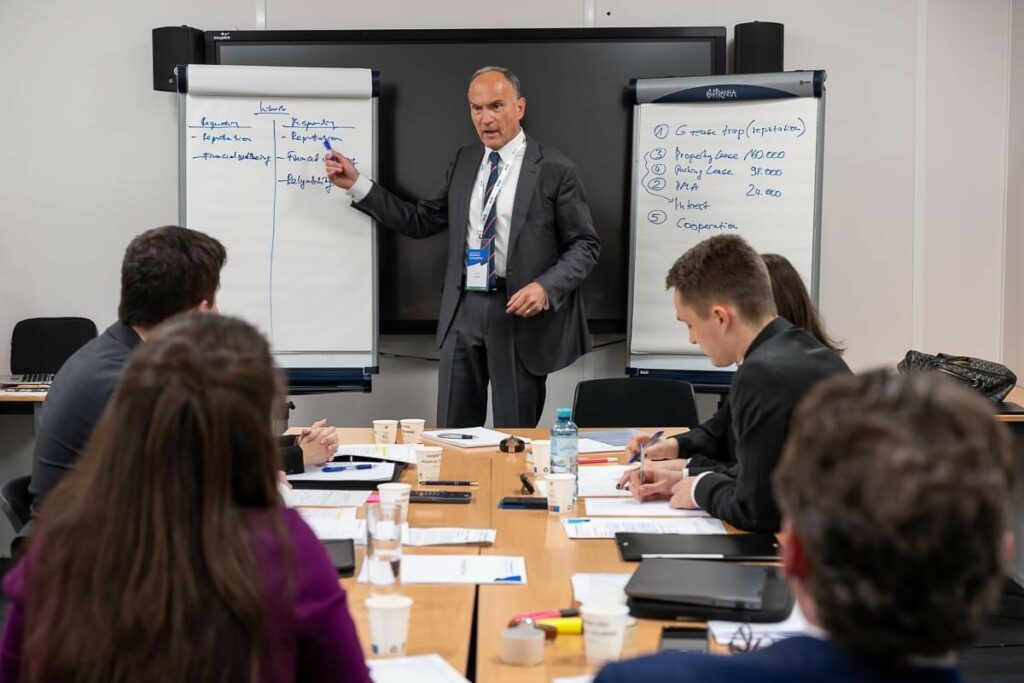
2023
[MEDIATION] Speaker online at WIPO Mediation Workshop, November 28, 2023 (0:00:00 – 0:00:00)
[MEDIATION] Speaker online on November 7, 2023 with Garance Goujard, Nicolas Fournier, Ben Davis and Thierry Bériault, moderated by Jeremy Lack, at AFIM CyberWeek : « Online intercultural mediation with French-speaking parties and/or mediators » (« La médiation en ligne avec des parties et/ou des médiateurs francophones ») 0:18:30 in French
[MEDIATION] Speaker online at CMAP GER 4 on June 29, 2023 about « La médiation à l’international en ligne » in French
[MEDIATION] Speaker at 13th World Chambers Congress, Geneva, on June 22, 2023 on “Keeping Business Moving: The role of dispute resolution services in preventing disruptions and supporting business operational continuity”, moderated by Alexander G. Fessas (France) with Alison Pearsall (France), Tuuli Timonen (Finland), and Martin Hauser (Germany)
Published in ICC Dispute Resolution Bulletin, Issue 2023-3, p. 24 – 25, and made available with kind permission of ICC. All ICC publications are available at https://LIBRARY.ICCWBO.ORG
[MEDIATION] Speaker at the IAM Spring Conference on June 2, 2023, Zürich, Switzerland, “Do Mediators Really Practice Differently Around the World: An Exploration of Mediation Concepts, Styles, and Strategies”, introduced by Ulla Glässer (Germany) with Michel Kallipetis (Great Britain), Douglas Murphy (Australia), Jan Frankel Schau (USA), Varuna Bhandari Gugnani (India) and Martin Hauser (Germany)

2022
[MEDIATION] Speaker online at WIPO Mediation Workshop, November 8, 2022 (1:12:25 – 1:54:38)
[MEDIATION] IBA joint webinar Octobre 12, 2022 : « Art disputes and mediation«
[MEDIATION] IBA webinar June 14, 2022 : « Investor-state mediation: From IBA to ICSID – the road ahead »
[MEDIATION] In ICSID’s Investment Mediation Insights webinar of January 26, 2022 » Episode 6 – A conversation with Investment Mediators » Frauke Nitschke spoke with three mediators with experience in investor-state disputes, Mercedes Tarrazon, Bill Marsh and Martin Hauser, about how investment mediation compares to commercial mediation and the types of qualification needed to mediate international investment disputes. 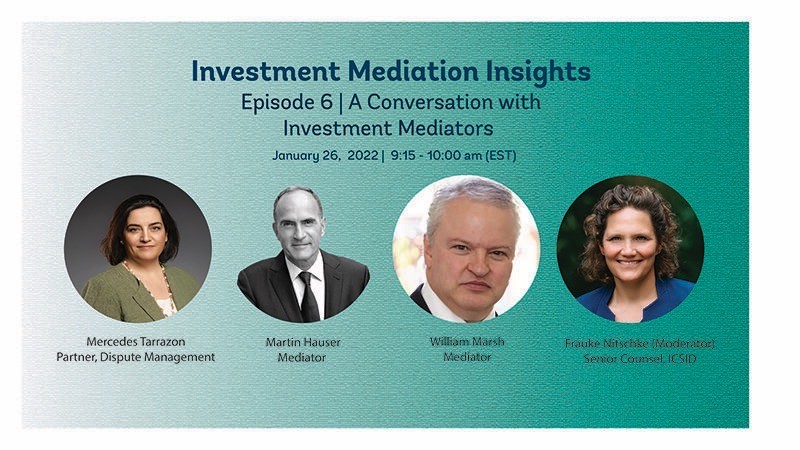
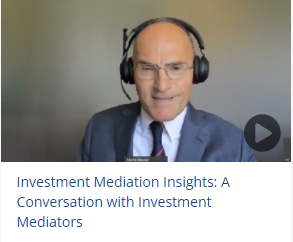
[MEDIATION] Panel discussion on » Investor-State Mediation – Framework, Practice & Capacity Building » with Frauke Nitschke (ICSID), James South (CEDR), Alejandro Caballo Leyda (International Energy Charter) and Wolf von Kumberg to kick off the first IIMC Colombo, Sri Lanka, Investor-State Mediation Competition, January, 10, 2022
2021
[NEGOTIATION & MEDIATION] » Why are intellectual property disputes particularly suitable for negotiation and mediation? « , IBA Mediation Committee Publications, December 2021
[MEDIATION] Singapore Convention Week September 6-10, 2021, Webinar September 9, 2021 : « A Cameo Gathering: Voices on the Singapore Convention Two Years On«
[MEDIATION] « In the deadlock: the refusal to talk », IBA Mediation Committee Publications, January 2021
[MEDIATION & NEGOTIATION] Finals of the 16th ICC International Commercial Mediation Competition on February 11, 2021: University of Auckland (New Zealand) and Sofia University St. Kliment Ohridski (Bulgaria)
It was a privilege and pleasure to have been designated by the ICC to act online on February 11, 2021 in the evening as mediator in the finals of the 16th ICC international commercial mediation competition and to work with the brilliant students Bronwyn Wilde and Britney Clasper of The University of Auckland (New Zealand) and Kristina Gorcheva and Dayana Zasheva of Sofia University St. Kliment Ohridski (Bulgaria). I was impressed by their negotiation skills, their collaborative approach and their understanding of interest-based negotiation. Even more so, as universities still seem not to teach principled negotiation. Congratulations to the students and their coaches Isabelle Kwek, Matthew Jackson and Dima Alexandrova for their valuable work. I hope that the students also enjoyed the competition in this forward-looking online format.
Source: ICC International Chamber of Commerce, Paris
[MEDIATION] « La médiation commerciale à l’international, le rayonnement de Paris à l’international » (International commercial mediation, the influence of Paris internationally), Revue Lamy Droit des Affaires, Dossier de la Médiation en Entreprise, n°166 January 2021, p. 41-47
Read more, download the Article >
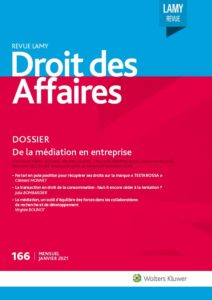
Avec l’autorisation de la Revue Lamy Droit des Affaires / Wolters Kluwer France
2020
[MEDIATION & NEGOTIATION] WIPO – CAM Webinar on Mediation for IP and Technology Transactions, November 12, 2020
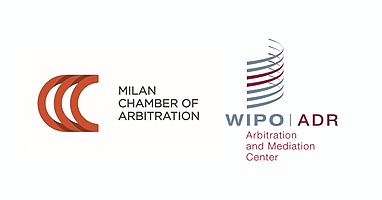
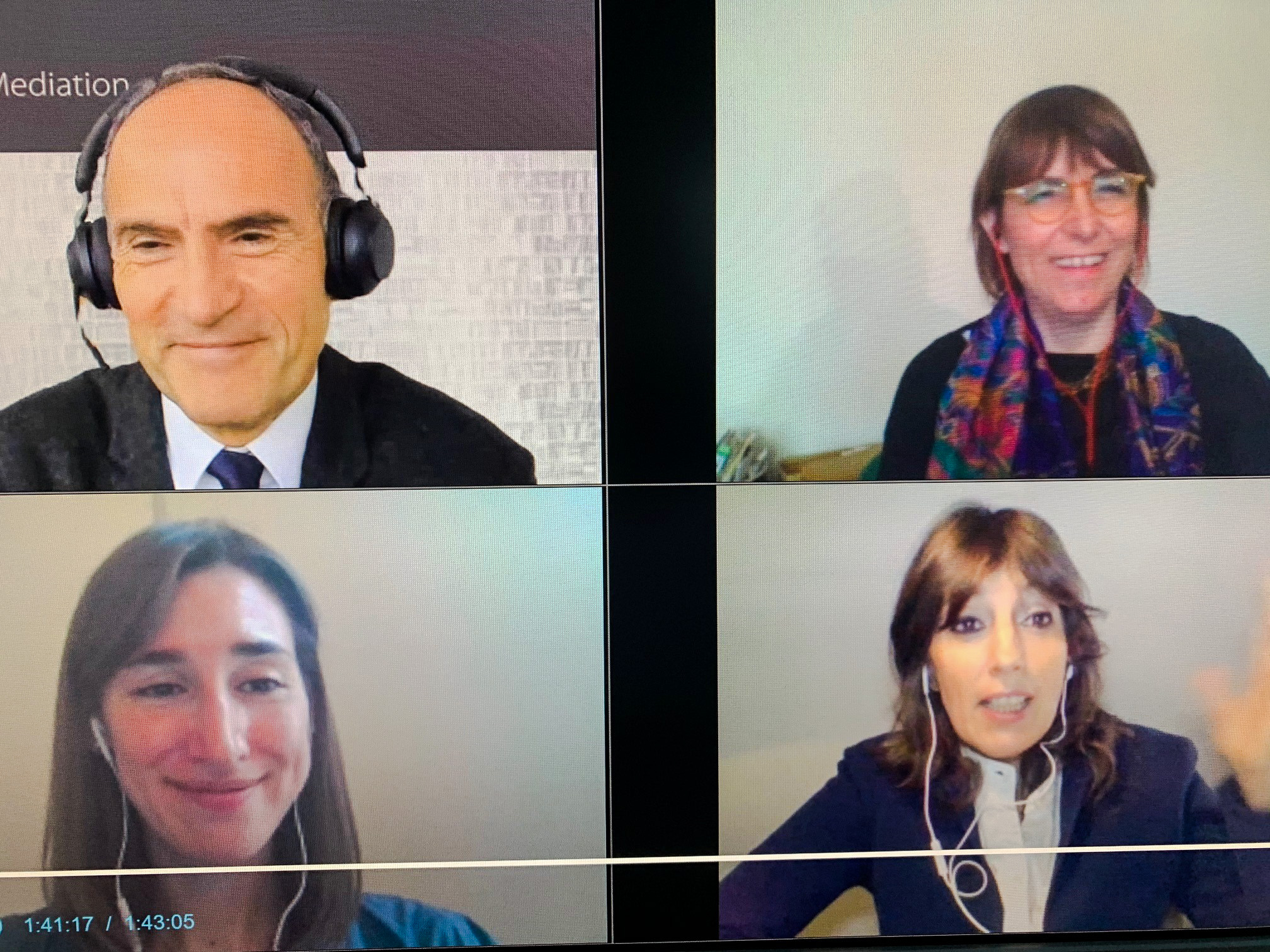
Source: WIPO Center – CAM, Geneva – Milan
[MEDIATION & NEGOTIATION] ICC Dispute Resolution Bulletin, Issues 2020-2: « What Makes Parties Choose Commercial and Investment Mediation ? »
BOOK REVIEW of « Mediation in International Commercial and Investment Disputes », Edited by Catherine Titi and Katia Fach-Gomez, Oxford University Press, 2019
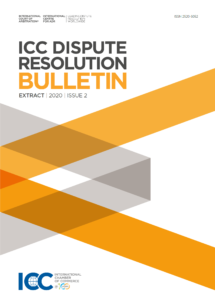
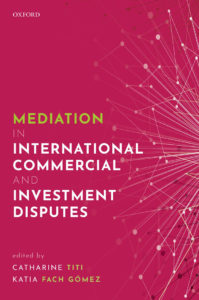
Published in ICC Dispute Resolution Bulletin, Issue 2020-2 and made available with kind permission of ICC. All ICC publications are available at https://library.iccwbo.org
[MEDIATION & NEGOTIATION] ICC Webinar May 28, 2020 : « Now is the right time for ICC mediation! » (« La médiation ICC, c’est maintenant!« )
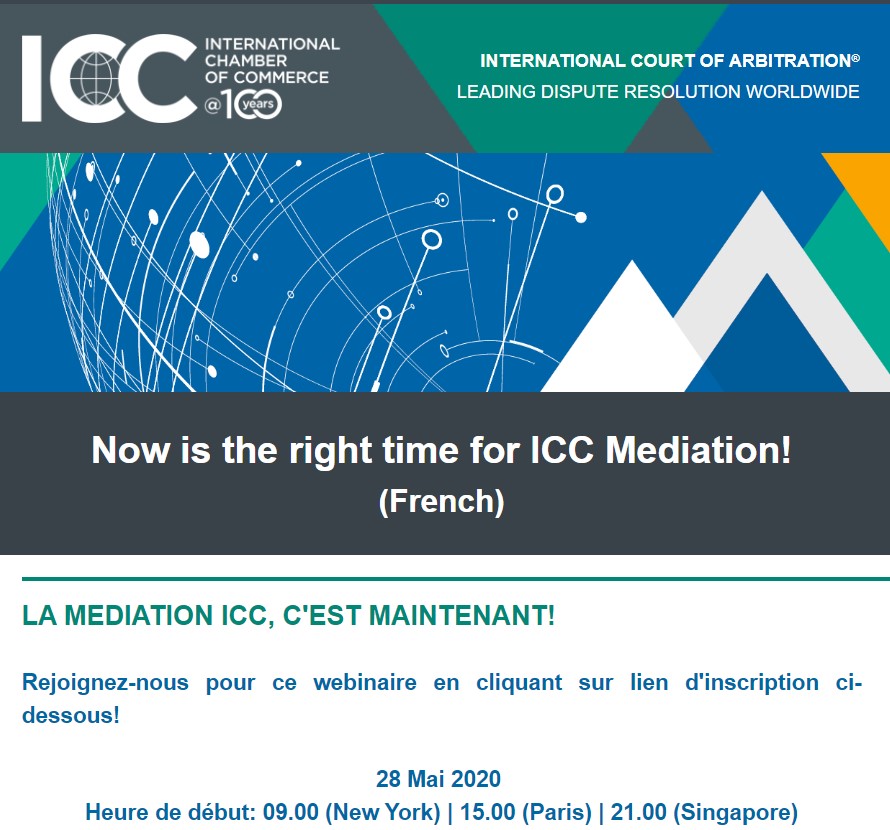
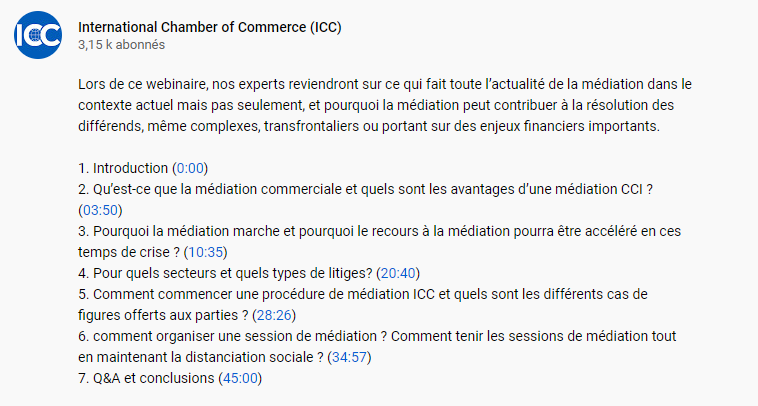
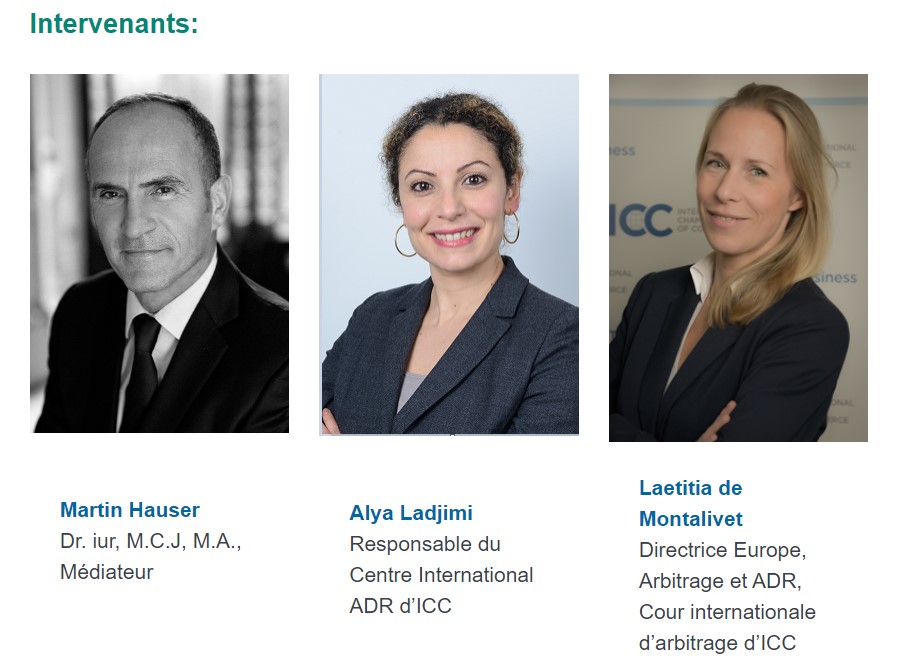
Edited transcript in the English language of selected extracts of the Webinar « Now Is the Right Time for ICC Mediation! » (« La médiation ICC, c’est maintenant! »)
Reproduction with kind permission of the International Chamber of Commerce (ICC)©. This article was published in the ICC Dispute Resolution Bulletin, issue 2020-3 and is also available in the ICC Digital Library (http://library.iccwbo.org)
Source: ICC International Chamber of Commerce, Paris
[MEDIATION & NEGOTIATION] Semi-Finals of the 15th ICC International Commercial Mediation Competition on February 11, 2020: University of Auckland (New Zealand) and Eotvos Lorand University (Hungary)
On February 11, 2020 I had the honor and pleasure within the 15th ICC International Commercial Mediation Competition in Paris to mediate the semi-finals with Madeleine and Keeha of the University of Auckland, New Zealand, and Andrea and Luca of the Eotvos Lorand University, Hungary. They were fantastic with wonderful negotiation skills. There is hope for a cultural change in conflict resolution with these young people ! Thank you to all four and to ICC for inviting me to this annuel event.
(Video starting at minute 9:27)
ICC Mediation Competition Semi-Finals: University of Auckland vs. Eotvos Lorand UniversityMultistreaming with https://restream.io/
Publiée par ICC Mediation sur Mardi 11 février 2020
Source: ICC International Chamber of Commerce, Paris
2019
[NEGOTIATION & INTELLECTUAL PROPERTY] with Lukas Schaugg, « To Negotiate, but How? The Example of Cross-Border Intellectual Property Disputes from a French Perspective » in, Bezpieczenstwo Gospodarcze Polski – Wlasnosc Intelektualna I Jej Efektywne Wykorzystanie W Dzialalnosci Przedsiebiostwa – Aktualne Problemy (The Economic Security of Poland – Intellectual Property and its effective use in Business – Current Problems), KUL Publishing House, Lublin 2019, p. 349 – 353
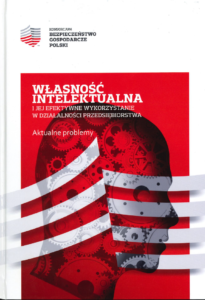
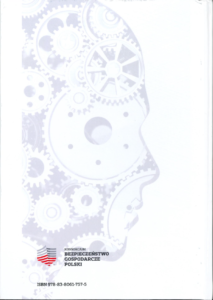
2018
[MEDIATION & NEGOTIATION] The Negotiation Academy
When to chose conflict resolution by mediation? How do you recognize a good mediator and negotiator?
Martin Hauser, member of the jury for the finals, answers these questions raised by The Negotiation Academy following the 4th edition of the IBA-VIAC CDRC international mediation competition in Vienna.
« What cases should lawyers recommend for mediation?«
« What skills are expected from a good negotiator and mediator?«
« Cases best suited for mediation«
« Competition tips«
Source: The Negotiation Academy (Claudia Winkler)
2017
[INTELLECTUAL PROPERTY – TRADEMARKS] with Stéphane Dassonville, « Et si les douanes décidaient de ne plus défendre vos marques en France… » (What if customs decided to no longer defend your trademarks in France?)
En France, les douanes jouent un rôle important dans la lutte contre la contrefaçon, notamment grâce à la retenue douanière.
En pratique, de plus en plus, les titulaires de marque se déchargent du coût, du risque et de la responsabilité de la lutte contre la contrefaçon de leurs marques sur l’administration douanière. Les douanes prennent souvent le relais des acteurs économiques, lorsque ceux-ci ne souhaitent pas agir devant les tribunaux.
Pourtant, est-ce qu’il appartient réellement à l’Etat français de supporter le coût de la protection du monopole économique d’intérêts privés ?
C’est indirectement à cette question que la Cour d’Appel de Paris a répondu dans sa décision du 13 septembre 2016…
2016
[NEGOTIATION & INTELLECTUAL PROPERTY] « Verhandeln, aber wie? Am Beispiel von grenzüberschreitenden Streitigkeiten im geistigen Eigentum aus französischer Sicht » (Negotiate, but how? The example of cross-border intellectual property disputes), in Collection (« Festschrift ») in honour of Gernot Schulze – Anwalt des Urheberrechts, edited by Thomas Dreier, Karl-Nikolaus Peifer, Louisa Specht, Munich 2017, p. 361-368
Um grenzüberschreitende Streitigkeiten, insbesondere im Bereich des geistigen Eigentums zu lösen, versuchen Unternehmen verstärkt, diese selbst zuregeln, bevor sie die staatlichen oder die Schiedsgerichte anrufen. Der Grund hierfür liegt in der Besonderheit dieses Bereichs, der wesensgemäß mit einem „Affekt“ behaftet ist, der nicht notwendigerweise in anderen Rechtsgebieten existiert, sowie in der eventuellen, mit einer gerichtlichen
Verurteilung einhergehenden Rufschädigung.
Das Verhandeln ist heute das wichtigste Mittel für die Lösung von Konflikten…
Read more, download the article >

[NEGOTIATION & INTELLECTUAL PROPERTY] « Négocier, mais comment ? L’exemple de litiges transfrontaliers en propriété intellectuelle » (Negotiate, but how? The example of cross-border intellectual property disputes)
Pour résoudre un conflit transfrontalier, notamment dans le domaine de la propriété intellectuelle, les entreprises cherchent davantage à les résoudre elles-mêmes, avant de saisir les tribunaux étatiques ou arbitraux, en raison de la particularité de la matière, par essence empreinte d’un « affect » qui n’existe pas forcément dans d’autres domaines du droit et de la réputation liée à une éventuelle condamnation judiciaire.
La négociation constitue aujourd’hui le principal moyen de résolution des litiges commerciaux…
[MEDIATION] MÉDIATION ET ENTREPRISE : NOUVELLES OBLIGATIONS ET PERSPECTIVES : JCPE 2016, N° 39, 1505, P. 21 (CO-AUTEUR)
La généralisation de la médiation de la consommation constitue une opportunité pour les entreprises de développer les modes amiables de résolution des conflits.
Avec une approche à la fois académique et pratique, cette étude volontairement multidisciplinaire présente les nouvelles contraintes règlementaires et concrètes applicables en matière de litiges de consommation et les perspectives qu’offre plus généralement la médiation pour la compétitivité et la performance des entreprises….
Read more, download the article >
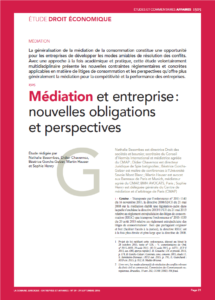
2015-2010
[MEDIATION] « Sur vingt-cinq médiations, je n’ai connu que trois échecs » (Out of twenty-five mediations, I have only experienced three failures), Entretien Carrières Juridiques.com
Capucine Coquand pour Carrières Juridiques.com : « Martin Hauser un avocat passionné. Franco-Allemand, son expérience est multiculturelle. Il en est certain ; le différend ne doit pas systématiquement se régler devant un tribunal. Médiateur depuis huit ans, nous l’avons rencontré pour en savoir plus sur ce mode alternatif de règlement des différends qui intéresse de plus en plus d’entreprises.... »
Read more, download the article >

[MEDIATION] ICCMW Day One: Martin Hauser
French/German lawyer, arbitrator and mediator, BMH AVOCATS (Paris)
[MEDIATION] « Welches nationale Mediationsrecht am Beispiel der Verschwiegenheitspflicht ist auf grenzüberschreitende Wirtschaftsmediationen in der Europäischen Gemeinschaft anwendbar? » (Which national mediation law is applicable to cross-border business mediations in the European Community, using the example of confidentiality?)
Am Beispiel der Verschwiegenheitspflicht im Rechte der Mediation Frankreichs, Österreichs und Deutschlands soll die Problematik des auf grenzüberschreitende Mediationen anwendbaren nationalen Mediationsrechts beleuchtet werden. In Umsetzung der Europäischen Mediationsrichtlinie wurden in den drei Ländern mediationsrechtliche Regelungen erlassen, die trotz einer gewissen Harmonisierung unterschiedliche Regelungen vorsehen. Hinzu kommen die Vorschriften für die jeweiligen Herkunftsberufe der Mediatoren…
[MEDIATION] « Quel droit national est applicable aux médiations transfrontalières dans la Communauté européenne à travers l’exemple du devoir de confidentialité ? » (Which national mediation law is applicable to cross-border business mediations in the European Community, using the example of confidentiality?)
Nous nous proposons d’examiner la question de savoir quel droit national est applicable aux médiations transfrontalières, à travers l’exemple du devoir de confidentialité en droit français, autrichien et allemand de la médiation. Lors de la transposition de la Directive européenne relative à la médiation, les trois pays ont édicté des règles en matière de droit de la médiation qui prévoient des réglementations différentes en dépit d’une certaine harmonisation. S’y ajoutent les dispositions applicables aux professions d’origine respectives des médiateurs telles que celle d’avocats praticiens de la médiation, qui sont marquées d’une empreinte nationale…
[MEDIATION] « La médiation commerciale en France et en Allemagne – une comparaison
Concepts, finalités, fondamentaux, aspects interculturels, divergences » (Commercial mediation in France and Germany, a comparison – Concepts, aims, fundamentals, intercultural aspects, differences)
On oppose habituellement un « modèle de médiation occidental » unique, qui vient des Etats-Unis et englobe la France et l’Allemagne, à un modèle de médiation dit « oriental ». Le présent travail s’intéresse à la question de savoir si la médiation commerciale est identique en France et en Allemagne ou si elle est l’expression de chacune des cultures française et allemande et si la finalité de la médiation commerciale et sa pratique sont influencées par la culture nationale.
Les différentes formes de médiation extra-judiciaire et judiciaire des deux pays seront tout d’abord décrites et différenciées. Ensuite sera explorée, dans les deux cultures, la compréhension historique et philosophique de la médiation, qui façonne l’objectif poursuivi par la médiation en France et en Allemagne. Puis, on comparera les modèles et la pratique de la médiation commerciale dans les deux pays. Enfin, les principes fondamentaux de la médiation en France et en Allemagne seront examinés….
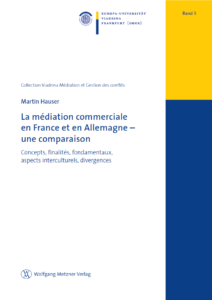
[MEDIATION] « Wirtschaftsmediation in Frankreich und Deutschland im Vergleich
Konzepte, Ziele, Grundlagen, Interkulturelles, Unterschiede » (Commercial mediation in France and Germany, a comparison – Concepts, aims, fundamentals, intercultural aspects, differences)
Üblicherweise wird ein einheitliches sogenanntes „westliches Mediationsmodell“, das aus den USA kommt und Frankreich und Deutschland einschließen soll, einem sogenannten „östlichen Mediationsmodell“ gegenübergestellt. Die vorliegende Arbeit beschäftigt sich mit der Frage, ob Mediation in Frankreich und Deutschland identisch ist oder Ausdruck jeweils französischer und deutscher Kultur, und ob Zielverständnis und Praxis der Wirtschaftsmediation von nationaler Kultur geprägt sind.
Zunächst werden die unterschiedlichen Formen der außergerichtlichen und der gerichtsinternen Mediation in beiden Ländern dargestellt und abgegrenzt. Sodann wird in beiden Kulturen das geschichtliche und philosophische Verständnis von Mediation, das deren jeweiliges Zielverständnis prägt, erforscht. Daran anschließend werden die jeweiligen Phasenmodelle und die Praxis der Wirtschaftsmediation in beiden Ländern verglichen. Die wesentlichen Grundprinzipien von Mediation in Frankreich und Deutschland werden abschließend betrachtet….
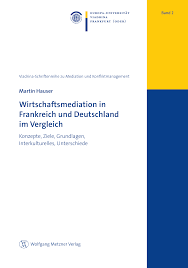
[MEDIATION & NEGOTIATION] « Existiert die Vertrags- und Verhandlungsfreiheit? » (Does the freedom of contract and negotiation exist?)
Das Verhandeln als Konfliktbearbeitungsverfahren genießt große Popularität und wird aus Unternehmenssicht als das vorteilhafteste Verfahren bewertet. Verhandeln ist Ausdruck der verfassungsrechtlich geschützten Vertragsfreiheit, der die Annahme zugrunde liegt, dass Wirtschaftsparteien sich selbstbestimmt, eigenverantwortlich und vernünftig verhalten. Zwar ist bekannt, dass die freie Willensbildung durch psychologische Determinismen sowie kognitive Barrieren und Verzerrungen beeinträchtigt werden kann. Jüngere sozialpsychologische Forschungen aus Frankreich gehen sogar darüber hinaus, indem sie nahelegen, dass Menschen in ihrer Entscheidungsfindung umso weniger „frei“ handeln, als sie zuvor ausdrücklich als „frei“ erklärt wurden. Mit anderen Worten, eine an einen Verhandlungspartner gerichtete „Freiheitserklärung“ könnte sich als Falle für die Ausübung echter Freiheit und damit als Manipulation seiner freien Willensbildung erweisen. Die Vertragsfreiheit wäre demnach illusorisch, und es stellt sich abschließend die Frage, was Wirtschaftsparteien tun müssten, um die ihr verfassungsmäßig garantierte Vertragsfreiheit auch tatsächlich wahrnehmen zu können…
[MEDIATION & NEGOTIATION] « La liberté contractuelle et de négociation existe-t-elle ? » (Does the freedom of contract and negotiation exist?)
La négociation comme processus de gestion des conflits jouit d’une grande popularité et est estimée être le processus le plus avantageux du point de vue des entreprises. La négociation est l’expression de la liberté contractuelle protégée par le droit constitutionnel et reposant sur l’hypothèse selon laquelle les parties économiques ont un comportement autodéterminé, responsable et raisonnable. On sait certes que les déterminismes psychologiques et les barrières et distorsions cognitives peuvent entraver la libre formation de la volonté. Les récentes recherches françaises en psychologie sociale vont même au-delà en laissant entendre que les individus agissent d’autant moins « librement » dans leur prise de décision qu’ils auront explicitement été déclarés « libres » auparavant. En d’autres termes, une « déclaration de liberté » à l’adresse d’un partenaire de négociation pourrait s’avérer être un piège pour l’exercice de la vraie liberté et donc une manipulation de la libre formation de la volonté de la personne. La liberté contractuelle serait donc illusoire et la question est en conclusion de savoir ce que les parties économiques devraient faire pour pouvoir exercer effectivement la liberté contractuelle qui leur est garantie conformément à la Constitution….
[MEDIATION] « Was kann die Parteien für die Mediation motivieren? » (What can motivate the parties to mediate?)
Es wird in jüngerer Zeit von verschiedenen Seiten in Europa immer wieder die Frage aufgeworfen, warum sich die Mediation als Streitbeilegungsmethode auch im grenzüberschreitenden Wirtschaftsverkehr trotz ihrer Vorzüge immer noch nicht durchsetzen konnte . Abgesehen von den Fällen, in denen die Mediation vertraglich oder als Vorstufe zu einem Gerichtsverfahren zwingend vorgesehen ist, zögern Rechtsanwälte und Wirtschaftsmandanten nach wie vor, freiwillig diese alternative Form der Konfliktbearbeitung zu wählen. Die Studie des Europäischen Parlaments von Januar 2014 spricht sogar von einem „EU Mediation Paradox“, demzufolge in der EU „trotz ihrer bewiesenen und zahlreichen Vorteile“ nach wie vor in weniger als 1% aller Zivil- und Handelsrechtsstreitigkeiten auf die Mediation zurückgegriffen werde . Auch der höchste französische Gerichtshof in Zivil- und Handelsstreitigkeiten, die „Cour de cassation“, hat in ihrem Bericht an die französische Justizministerin vom Dezember 2013 die Mediation als förderungswürdiges Streitbeilegungsverfahren bezeichnet, zu dessen Inanspruchnahme ermutigt werde solle. Wie erklärt es sich, dass bei Parteien und Anwälten in Europa ein der Mediation gebührender Erfolg bislang, trotz eines wachsenden theoretischen Interesses, ausgeblieben ist? Es soll nachfolgend der Versuch unternommen werden herauszuarbeiten, was die Parteien eines Wirtschaftskonfliktes, auch eines interkulturellen, motiviert, eher den Rechtsweg zu beschreiten, als sich für selbstbestimmtes Verhandeln im Rahmen einer Mediation zu entscheiden…
[MEDIATION] « Qu’est-ce qui peut motiver les parties à choisir la médiation ? » (What can motivate the parties to mediate?)
La question de savoir pourquoi, en dépit de ses avantages, la médiation n’est toujours pas parvenue à s’imposer comme méthode de résolution de différends dans les échanges économiques transfrontaliers est soulevée de manière récurrente par différentes parties en Europe ces derniers temps. Abstraction faite des cas où la médiation est impérativement prévue par contrat ou au titre d’étape préliminaire à une procédure judiciaire, les avocats et leurs clients de la sphère économique hésitent encore à choisir volontairement cette forme alternative de gestion des conflits. L’étude du Parlement européen en date de janvier 2014 parle même d’un « paradoxe de la médiation dans l’UE » selon lequel il n’est encore fait recours à la médiation que dans moins d’1 % de tous les litiges en matière civile et commerciale dans l’UE, « en dépit de ses avantages nombreux et prouvés ». Dans son rapport à la ministre française de la Justice en date de décembre 2013, la « Cour de Cassation », juridiction suprême de l’ordre judiciaire français en matière commerciale et civile, a qualifié elle aussi la médiation de processus de résolution de différends méritant d’être promu et dont l’usage doit être encouragé. Comment expliquer qu’en dépit d’un intérêt théorique croissant, la médiation n’ait pas rencontré à ce jour en Europe auprès des parties et des avocats le succès qui lui revient ? Nous allons tenter ci-après d’analyser ce qui motive les parties impliquées dans un conflit économique, y compris interculturel, à choisir la voie judiciaire plutôt que d’opter pour des négociations autodéterminées dans le cadre d’une médiation …
[MEDIATION] « Emotionsfreie Wirtschaftsmediation ? » (Commercial mediation without emotions?)
Nachfolgend soll untersucht werden, ob die Wirtschaftsmediation es den Parteien ermöglichen kann, einen Sachkonflikt unter Ausschalten der Emotionen erfolgreich zu bearbeiten, ohne zusätzliche Belastung und Zeitaufwand. Zunächst wird auf das juristische Mediationsmodell und das vermeintliche Sachlichkeitsgebot eingegangen, anschließend wird das Postulat rational entscheidender Parteien hinterfragt und unter psychologischen Gesichtspunkten kritisch gewürdigt, bevor Schlussfolgerungen für die Wirtschaftsmediation gezogen werden…
[MEDIATION] « La médiation commerciale exempte d’émotions ? » (Commercial mediation without emotions?)
Nous nous proposons d’analyser ci-après si la médiation commerciale peut permettre aux parties de régler un conflit matériel en faisant abstraction des émotions, sans tension, ni investissement en temps supplémentaire.
Nous aborderons tout d’abord le prétendu « modèle de médiation juridique » et son « principe d’objectivité », nous nous interrogerons ensuite sur le postulat des parties prenant une décision rationnelle et le soumettrons à une appréciation critique sous l’angle psychologique, avant d’en tirer des conclusions pour la médiation commerciale…
[MEDIATION] « Relevanz des Konfliktverständnisses für die Konfliktanalyse in der Wirtschaftsmediation” (Relevance of understanding of conflict for conflict analysis in commercial mediation), ZKM Zeitschrift für Konfliktmanagement 3/2014, p. 97–99
Ausgehend von dem Begriff des „Konfliktes“, den die Konflikttheorien unter verschiedenen Gesichtspunkten beleuchten, liefert die „Konfliktanalyse“ Ansätze zum Behandeln eines Konfliktes im Rahmen einer Mediation. Während das „Konfliktverhalten“ der an einem Konflikt Beteiligten unmittelbare Auswirkungen auf eine Wirtschaftsmediation hat, soll demgegenüber nachfolgend untersucht werden, inwieweit bereits das „Konflikt(vor)verständnis“ der Parteien und des Mediators in der „Konfliktanalyse“ einen Einfluss auf die „Zielvorstellung“ der Parteien und des Mediators in der Praxis der Wirtschaftsmediation haben…
[MEDIATION] « L’incidence de la notion de conflit dans l’analyse des conflits en médiation commerciale » (Relevance of understanding of conflict for conflict analysis in commercial mediation)
Les théories de conflit abordent sous différents angles le « conflit» et ses origines possibles, « l’analyse des conflits » quant à elle à effectuer par le médiateur préalablement et tout au long de la médiation, fournit des approches pour traiter un conflit en médiation. Les développements qui suivent examinent dans quelle mesure la « compréhension du conflit » par les parties et par le médiateur influe dans « l’analyse des conflits » sur « l’objectif » poursuivi par eux, dans la pratique de la médiation commerciale…
[MEDIATION] « Die Vergütung von Mediatoren in Wirtschaftsmediationen in Frankreich- aus Sicht eines Rechtsanwalts » (Remuneration of mediators in commercial mediations in France: a lawyer’s point of view)
Während sich Anwälte, Unternehmen und Richter über die finanziellen Vorteile der Inanspruchnahme einer Mediation befragen, so haben die Mediatoren selbst oft den Eindruck, dass ihre Aufgabe nicht in der entsprechenden Höhe der Leistungen, die sie den Unternehmen zur Verfügung stellen, honoriert wird. Sie tragen dazu bei, in wenigen Wochen, manchmal auch in nur wenigen Stunden, einen Konflikt beizulegen, für den seit Monaten oder Jahren keine Lösung gefunden werden konnte. Überdies stellen sie die Kommunikation zwischen den Parteien wieder her und unterstützen häufig die Wiederaufnahme von wirtschaftlichen Beziehungen. Mediatoren werden fachspezifisch ausgebildet, unterziehen sich einer Prüfung zur Feststellung ihrer Kompetenzen und haben folglich Anrecht auf eine entsprechende Vergütung. Im Allgemeinen wünschen sich die Mediatoren eine größere finanzielle Anerkennung ihres Beitrags zur Lösung eines Streitfalls seitens der Unternehmen. Grundsätzlich sei die Zahlung eines Erfolgshonorars nicht möglich, da diese Art der Vergütung die Unparteilichkeit des Mediators in der Streitsache in Frage stellen würde. Die Teilnehmer der Konferenz waren also dazu aufgerufen, sich zu der Frage zu äußern, ob die Tätigkeit als Mediator unter den gegebenen Umständen tatsächlich gewinnbringend ist? Welches sind die Zukunftsaussichten für diese Tätigkeit?…
[MEDIATION] « La rémunération des médiateurs dans les médiations commerciales en France : le point de vue d’un avocat » (Remuneration of mediators in commercial mediations in France: a lawyer’s point of view)
Si les avocats, les entreprises et les magistrats peuvent s’interroger sur les avantages financiers qu’il y a de recourir à la médiation, les médiateurs ont souvent le sentiment que leur mission n’est pas rémunérée à la hauteur de la prestation qu’ils offrent aux entreprises. En quelques semaines, parfois quelques heures, ils vont permettre de résoudre un conflit pour lequel aucune solution n’était trouvée depuis des mois, voire des années. De surcroît, ils vont rétablir la communication entre les parties et favoriser, dans de nombreux cas, la reprise des relations commerciales. Les médiateurs suivent une formation à la médiation, ils se soumettent à un examen pour valider leurs compétences et ont donc toute légitimité à être rémunérés en conséquence. Généralement, les médiateurs souhaiteraient des entreprises une plus grande reconnaissance financière de leur investissement dans la résolution d’un litige. A priori, l’honoraire de résultat ne serait pas possible pour le médiateur des lors que ce mode de rémunération porterait atteinte à sa neutralité dans le dossier. Les membres de la table ronde étaient donc appelés à apporter leur éclairage sur la question de savoir si, dans ces conditions, l’activité de médiateur est réellement rémunératrice ? Quelles sont les perspectives d’avenir pour cette fonction ?…
[MEDIATION] « L’avocat doit systématiquement évaluer l’opportunité de recourir à la médiation » (The lawyer must systematically assess the advisability of resorting to mediation), Dallzo Avocats, n° 1, January 2014, P 20-21
Dalloz avocats | Quelle est selon vous la mission de l’avocat ? « Notre culture traditionnelle de résolution des litiges commerciaux est marquée par le recours aux tribunaux judiciaires. Le travail de l’avocat consiste alors à transposer les faits à l’origine d’un litige que son client lui expose en des catégories normatives posées par des textes législatifs. Ce processus de transformation de faits « vivants » en des catégories « abstraites », écarte non seulement les émotions des parties en conflit, mais se traduit par la formulation de positions juridiques et des demandes en droit.
La mission de l’avocat consiste à représenter au mieux les « intérêts » de son client, ce qu’il pense faire sincèrement. Cependant, depuis le début des années 1980, avec les travaux des chercheurs du « Harvard Negotiation Project », on constate que ce n’est pas nécessairement le cas. Il a été démontré qu’une décision de justice qui tranche le litige ne peut, par nature, pas créer de valeurs et, que, dans la plupart des cas, les négociations directes aboutissent également à de simples « compromis » suivant l’adage « couper la poire en deux »… »
Read more, download the article >
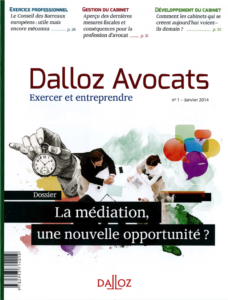
2009-2000
[INTELLECTUAL PROPERTY & SOFTWARE] « Der internationale Softwarevertrag nach deutschem und ausländischem Recht — Frankreich » (The international software contract under German and foreign law – France), 2006, Verlag Recht und Wirtschaft, 2ème édition, Francfort sur le Main (co-auteur)
Der urheberrechtliche Schutz von Software hat in Frankreich nur allmählich eine feste Grundlage gefunden. Zwar wurde er von französischen Gerichten seit Ende der 70er Jahre überwiegend bejaht, ohne dass das französische Urheberrechtsgesetz vom 11. März 1957 seinerzeit Software ausdrücklich als schutzfähige Werke aufgeführt hätte. Die Lehre hingegen bekannte sich nicht einmütig zu diesem Schutz als urheberrechtlich relevante Geisteswerke. Eine gewisse Rechtsunsicherheit ergab sich in der Praxis ferner dadurch, dass einige Gerichte Urheberrechtsschutz für Computerprogramme ausdrücklich verneinten. In diesem Sinne führte der Pariser Berufungsgerichtshof in seiner Entscheidung vom 4.Juni 1984 aus, dass es sich bei einem Computerprogramm letztlich nur “um eine technologische Zusammenstellung handelt, die manchmal geschickte Elektromechaniker verlange, dass es aber nicht angebracht sei, dieses ,weihevoll’ in den Rang der im Gesetz von 1957 vorgesehenen Geisteswerke zu heben”.
Um der zunehmenden internationalen wirtschaftlichen Bedeutung von Software Rechnung zu tragen, brachte der Gesetzgeber trotz gleichzeitiger Überlegungen zur Schaffung eines Sonderrechtsschutzes für Software eine ausdrückliche und rasche Klärung der Rechtslage, indem er durch Gesetz vom 3. Juli 1985 zumindest “vorläufig” Software unter die gemäß Art. 3 des Urheberrechtsgesetzes von 1957 schutzfähigen Werkarten einordnete und damit grundsätzlich dem Urheberrechtsschutz unterstellte. Gleichwohl sah Titel V dieses Gesetzes von 1985 eine Reihe von Software spezifischen Sonderbestimmungen vor, die in den Text des Urhebergesetzes zunächst nicht integriert wurden und in Abweichung von den allgemeinen urheberrechtlichen Prinzipien als Zwischenschritt zu einem Sonderrechtsschutz erscheinen mussten.
In einer zukunftsweisenden Entscheidung stellte ferner das höchste ordentliche französische Gericht, der Kassationsgerichtshof, in Plenarversammlung am 7. März 1986 in seiner berühmten Entscheidung “Babolat/Pachot” fest, dass Software, die “Originalität” aufweist, als Geisteswerk urheberrechtlich geschützt ist.
Schließlich wurde 1992 in Frankreich das gesamte Rechtsgebiet des geistigen Eigentums (“propriété intellectuelle”) in einer einzigen Kodifikation, dem Code de la propriété intellectuelle (Gesetz No. 92-597 vom 1. Juli 1992), zusammengefaßt. Es handelt sich hierbei in Wirklichkeit nicht um eine umfassende Neuschöpfung, sondern weitgehend um eine übersichtlichere Zusammenstellung der bestehenden und bislang verstreuten Gesetzestexte…
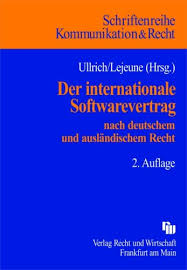
[INTERNET] « France: Selective distribution and the Internet«
Summary and comment of Paris Court of Appeals, chamber 5 section b, decision of 5 Septembre 2003, Rue du Commerce S.A. vs Jamo France Sarl, Computer Law Review International August 2004
1999-1990
[INTELLECTUAL PROPERTY & SOFTWARE] « Der internationale Softwarevertrag — Frankreich » (The international software contract – France), Verlag Recht und Wirtschaft, Heidelberg 1995 (co-auteur)
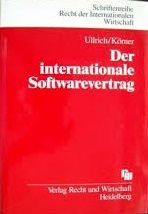
[INTERNET] « Concilier les intérêts des auteurs et des utilisateurs » (Reconciling the interests of authors and users), Expertises des systèmes d’information, décembre 1996, n° 200, p. 437 – 442
On a pu constater qu’aujourd’hui certains utilisateurs du Web revendiquent, paradoxalement, à la fois la plus grande liberté d’utilisation des informations qui sont disponibles sur l’Internet, et en même temps la protection de leurs propres œuvres sur ce réseau et la perception d’une juste rémunération d’auteur…Seront exposés quelques réflexions sur un principe de droit, la théorie de « l’épuisement du droit », qui pourrait donner une clé pour concilier la conception d’une « liberté absolue » sur l’Internet et la revendication d’une protection efficace des œuvres de l’esprit…
Read more, download the article >
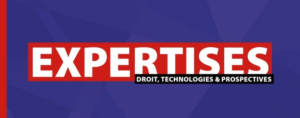
1989-1980
[INTELLECTUAL PROPERTY – PATENTS] « Der Patentlizenzvertrag im französischen Recht im Vergleich zum deutschen Recht » (The patent license agreement under French law compared to German law), Munich, J. Schweitzer Verlag, 1984
Read more, visit the website >
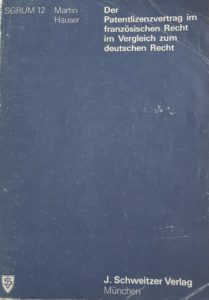
[INTELLECTUAL PROPERTY – PATENTS] « Drittwirkung und Registrierung von Patentlizenzverträgen in Frankreich — ein Vergleich mit der deutschen Rechtslage und den zu erwartenden Auswirkungen des Gemeinschaftspatentübereinkommens » (Third party effect and registration of patent license agreements in France – a comparison with the German legal situation and the expected effects of the European Community Patent Convention), GRUR Int. 1983, p. 858–865
Read more, visit the website >

[INTELLECTUAL PROPERTY & COMPETITION LAW] « Werbung mit Lockvogelpreisen in Frankreich » (Advertising with bait prices in France), GRUR Int. 1981, p. 218–223
Read more, visit the website >



